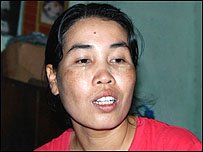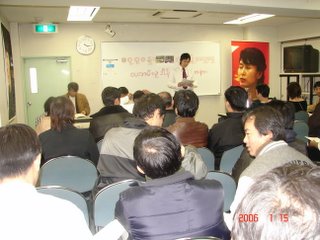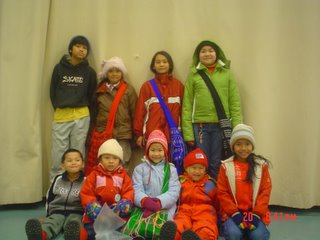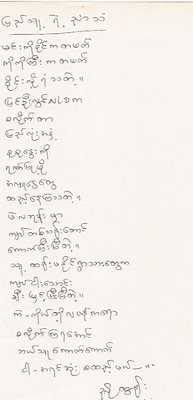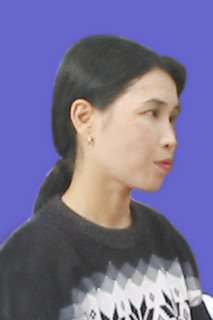Su Su Nway: the defender of Human Rights
Submitted to
Ms. Hina Jilani
Special Representative of the Secretary General on the situation of Human Rights Defenders
Prepared by
Burma UN Service Office
October 26, 2005
777 UN Plaza 6th Floor. New York. NY 10017. Ph. 212-338-0048. Fax: 212-338-0049
“I know I will end up in jail one day for advocating the truth, however; I want my fellow citizens to continue their struggle selflessly and responsibly toward eradication of forced labor in Burma.” – Su Su Nway
Given the severity of oppressions by the military regime, it is not a mystery to see Burma silenced and stabilized by reign of terror and fear. However, it is provocative to witness a village girl standing up to regime’s unjust orders, triumphing her own fear, lodging a lawsuit against mighty and bully authorities and exemplifying herself as a defender of justice and shading light of hope on her fellow citizens who have been subject to the same fate of being driven into forced labor. Her courage shown in her epic struggle to defend her own freedom and that of her fellow villagers from becoming forced laborers and her defiant spirit is much loved and respected by the people of Burma. Her seventeen-month long and hard-fought battle against forced labor practice has transformed her into an icon of courage.
Background
When an army becomes a utility of the unprincipled, the result is a sorrow nation – a nation suffering from perdition due to extreme dose of oppression and its citizens being eaten up by inferno of fear. Burma is an example of such nation. With threats to life so dire and direct if orders are not obeyed or governance is ever criticized, people of Burma live in fear and agony under highly authoritarian rule.
Burma’s military regime that came to be the de facto ruler of the country in 1988 through a violent coup d'état has never satisfied its thirst for attaining a permanent grip on the control of the state. During its seventeen-year rule, the regime has doubled the size of its army, spending more than 40% of the budget annually on expansion of its army and leaving a tiny fraction of the budget, less than 2%, on health and education sectors. With foreign investment shrinking and natural resources emptying, the country is left on the verge of economic devastation. With spending on education and health sectors not nearly enough to even understand the gravity of and far from being sufficient to tackle the problems, the country is accelerating at full speed toward social devastation. Under its rule, unnecessary losses of lives and human suffering have been rampant. In human term alone the magnitude of loss has been unimaginably huge, let alone other forms and kinds of losses.
In the face of multidimensional constraints, the regime sits on a utilitarian army and suffers a chronic disease of self-delusion. It always attempt to deceives itself and to the world by producing double-digit growth rate on paper. In trying to bridge reality on ground and inflated rosy statistics on paper, the regime runs into another dilemma of beautifying the country with empty pocket. The result is the inevitable use of forced labor that in an attempt to mislead the world, the regime called voluntary labor contribution. Regardless of what it is called, the practice fits the definition of forced labor.
The existence of forced labor in Burma has been confirmed and condemned by ILO for years. “It is not through the use of forced labor but through Burma’s traditional and noble culture of voluntarily contributing labor in the name of donation the construction and development projects are carried out,” the regime responded in the face of ILO’s continual criticisms and warnings. However, far from complying with ILO, the regime’s deployment of the practice has become more severe and prevalent over time and reached an alarming level where ILO cannot stay unheeded to the cries of forced laborers in Burma. In 2000, in an unprecedented move, ILO recommended its member countries the imposition of trade and other sanctions on Burma under Article 33. Thanks to the ILO’s stick, signals of willingness and commitment from the part of the regime to cooperate with ILO toward eradication of forced labor have been seen and for the first time ILO’s presence in Rangoon was allowed. Responding to ILO’s sanction stick, the regime has agreed to ILO’s recommendation as to steps needed to be taken and implemented. Consequently, Order 1/99 was issued, making the use of forced labor a criminal act and punishable under section 374 of the Penal Code.
Unfortunately, Burma’s supposedly independent legal system itself is the first casualty of military rule and has long been an obedient slave of the regime – effectively and tirelessly serving its master’s need to crush opposition and subdue and eliminate threat – perceived or real – from all directions. In a society where the house of justice where citizens come and seek for refuge and protection from the destructive forces of the unruly and abusive men has become inhospitable and blind to the notion of truth and justice, people are left at the mercy of the mighty tyrants and justice has lost its meaning. As a result, fear permeates deeper and wider throughout the nation and trust that weaves the fabric of society falls apart setting the nation on the course of devastation. Through the use of such legal system, thousands of students and political activists have been put behind bars, arbitrary killings and arrests have been justified and abusers have been granted immunity from existing laws.
Those who only see the existence of ILO office and the law that outlaws the practice of forced labor and draw conclusion that the regime is cooperative with the ILO are only seeing a fraction of the tip of the iceberg, for the road to ILO office is filled with threats to life. Because they once walked on that road to ILO to report about forced labor practices, three men were convicted of high treason and sentenced to death on charges that include contacting ILO regarding the situation of forced labor in Burma. ILO officers, within the space they can operate, have acknowledged, documented and reported piles of cases of the use of forced labor and incidents of arrests for attempting to contact ILO. Nevertheless, the force labor practice in Burma has been contagious and widespread, and so have the arrests and fear.
She who dares
Htan Ma Naging village is located about 200 kilometers away from the northwest of Burma’s capital Rangoon. Once a hub of trade and busy with merchants, the village now survives on farming. Six decades ago, the river on which the village sits ensured the flow of cargo ships, making the village flourished on trade. However, over times the river has formed sediments, preventing cargo boats from approaching the village. As a result, the village’s economy has fundamentally transformed from commerce-based to farming. The nearby town, Kaw Hmoo is four miles away from Htan Ma Naing. During monsoon season the road connecting Htan Ma Naing and Kaw Hmoo is unusable due to flood. Boats become only means of transportation for the villagers of Htan Ma Naing as roads get destroyed by flood. Surrounded by big shady trees, Htan Ma Naing is a village relatively pristine and approximately 400 household – mostly farmers – live there.
Su Su Nway was born to a family of farmers of Htan Ma Naing village. Third child of the family of seven and suffering chronic heart disease, she was raised and educated till eighth grade in her native village. Her parents, sympathetic to their frail and suffering daughter, never allow her to make strenuous effort. As her heart disease worsened when she was in her ninth grade, she became incapable of attending school and had to drop out. Her mother passed away when she was fifteen and her father seven years later.
Since becoming an orphan, Su Su Nway has been living with her two nephews – sons of her eldest brother Than Lwin who continues the family’s farming and spends most of his time in the farm. She manages her household, helps her nephews with their lessons and sells lottery tickets to help defrays part of her household cost of living.
Since childhood, she has been dreaming of becoming an attorney-at-law. She was so ambitious that while playing with her friends she always took the role of a lawyer. Unfortunately, the road to her dream had come to an end when she could not go to school. However, believing deeply in the value of education, she continued to learn from elderly politicians during her leisure times. The life of Burma’s Independence hero General Aung San is the topic of her interest. Enthusiastically, she learned about his leadership, selfless struggle and sacrifice to free Burma from British colonial rule. Equally enthusiastic topic for Su Su Nway is the leadership of Daw Aung San Suu Kyi in trying to free people of Burma from authoritarian military rule. She learns from her speeches the notion of courage particularly the means to face fear. It is through her self-taught education and the gospels of her role models that shape her moral compass.
She heard many tragic stories of villagers filled with intense grievances due to forced labor practices. She knew of a family from nearby village that had to bring their belongings including their clothing and mosquito net to the pawn shop in exchange for cash so that they can redeem themselves from forced labor and its consequences. She also knew an elderly lady attempted to commit suicide as the lady found herself without any option left to be granted amnesty. These true and tragic stories prompted her to be ready should the same nightmare of forced labor befall upon her villagers.
In March 2004, the forced labor, the nightmare that ruptures thousands of family and the ill that everyone fears, struck Htan Ma Naing Village, requiring as usual a person from each household to dig the ground for road construction.
On March 23, 2004, village heads of Htan Ma Naing made an announcement that villagers must contribute unpaid labor for road construction or pay 2000 Kyats. Some villagers chose a choice. But, Su Su Nway chose none. In fact, Su Su Nway together with her two neighbors, Daw Phyu and Daw Ngwe, were directly ordered by village authorities to dig. As the authorities warned Su Su Nway, she requested authorities to not impose order on those who were elderly, weak or not in sound health. As her request was declined she bluntly resisted the order by saying straight, “I would neither dig nor give 2000 Kyats.” She also urged her villagers to resist and stay unbowed to unfair orders. “Should the authorities become forceful and more aggressive, I would go and let higher ranking authorities know about the situation since force labor is in violation of the law,” said Su Su Nway to her villagers. About fifty villagers stayed unmoved by the order and stood by Su Su Nway in defiant of the village authorities.
A month later, on Friday April 23, 2004, authorities, furious by the resistance, announced again with more specific and severe threat, “anyone who has not dug a hole as directed and as required by order must do so now and get the job done by tomorrow and those who fail to complete the task will be arrested.” Su Su Nway being the spearhead of the resistant determined as promised to notify ILO about the forced labor.
On Monday, Su Su Nway headed Rangoon where ILO office is located. Not knowing how to get there, she first stopped by NLD office where she managed to get an NLD member to accompany her to the ILO office. Once they arrived at the ILO office, they were met by ILO liaison officer Mr. Richard Horsey. Su Su Nway explained Mr. Horsey in detail the village heads’ coercion on the villagers to contribute unpaid forced labor. Mr. Horsey explained Su Su Nway about 1/99 – the law that outlaw forced labor – and the due process that could be taken to protect villagers including herself from being coerced into forced labor. He also explained to her about the hardships that await if the legal action is taken.
Su Su Nway had a tough choice to make. She could choose the legal path through which she brings to the court lawsuit against the authorities, defending for herself and fifty villagers who stood by her. Given the fact that there has been no case in history where a civilian sued the authority, won and escaped from imposed threats or danger, this choice is extremely hard. On the other hand, she could go back and convey to her fellow villagers the message of sorrow and bear together the burden of forced labor and punishments. Knowing the consequences and implications each choice will create, Su Su Nway chose the tough one, asking Mr. Horsey how justice can be done.
Su Su Nway knew well about the abused legal system that throughout the 17-year tenure of military rule has been so crippled and corrupted that judgments are meant to appease the rulers not to protect the civilians. In the eyes of Burma’s current legal system the matters of fact are irrelevant. It is the matter of who are involved in the legal proceedings that counts. In this particular case of Su Su Nway Vs. Authority, the plaintiff is completely at the mercy of the defendant. When asked why she chose this dangerous road, Su Su Nway replied, “I know choosing this path will be dangerous and it is highly unlikely that I will win the legal battle but my villagers will be free from getting arrested because authorities will try to harm me in every possible way to their best of their ability; thereby I and I alone will face all inflicted threats not my villagers.” “It is a fact that we are coerced into forced labor. If I would be arrested because of telling the truth, I will tell the truth anyway and never be sadden,” continued Su Su Nway.
After getting advice from Mr. Horsey as to how legal action can be taken against the authorities who forcefully drove villagers to forced labor, Su Su Nway started preparation work to sue the authorities. She went to Ton Tay to get a lawyer. She met Ye Than, an NLD legal advocate. When requested by Su Su Nway to write a statement, Ye Than was skeptical and unimpressed by her frail figure. It was only after her persistent and repeated request that the lawyer agreed to write the letter.
Bringing the letter addressing to the court, Su Su Nway went to Kaw Hmoo to submit her notice of legal action to the township court. Upon hearing Su Su Nway’s explanation of why she was here, the clerk was amazed and enticed her to give up her plan to sue the authorities. As a matter of fact, it is unheard of for a young girl to sue powerful authorities under the climate of impunity.
In spite of all threats deliberately imposed by the authorities on civilians critical of forced labor practices, the first lawsuit by a mundane village girl against the authority has emerged thanks to the assistance of the ILO and the NLD legal experts. Under the watchful eyes of international community and the ILO, the proceeding of “Su Su Nway Vs. authorities” began.
Being the first to sue the authorities, Su Su Nway drew international attention thanks to Democratic Voice of Burma and other media that broadcasted in detail not only the progress of the proceeding but also the life of Su Su Nway.
The legal battle between Su Su Nway and authorities began, and so was the spread of news about the case. Everyone in the region particularly Kaw Hmoo and Htan Ma Naing was amazed and awestruck by Su Su Nway’s courageous act that no one had ever dared to undertake before. It was under the curious and watchful eyes of the local public Su Su Nway’s case was being heard at the township court of Kaw Hmoo.
The villagers of Htan Ma Naing were overwhelmed with joy as Su Su Nway selflessly bulwarked from the face of danger imposed by the authorities so that villagers could live in peace and be free from forced labor. To support Su Su Nway’s case, eleven villagers willingly agreed to be witnesses.
Since day one of her legal battle, Su Su Nway has been under threat from the authorities. On her way back from Kaw Hmoo to Htan Ma Naing on the day of her submission of her case to the township court, while she was on the bus, authorities, knowing that they were being sued, explicitly warned and threatened her that MI (military intelligence) officers would soon come and arrest her. A few days later, village authorities sent for Su Su Nway’s eldest brother Than Lwin and urged him to slap Su Su Nway’s face as a punishment for her disrespect for the authorities and disobeying the order. Than Lwin replied, “Let me investigate into what has happened first and than and only than will I decide what to do.” Regardless of the pressure and threats, both direct and indirect, Su Su Nway remained unblenched and determined.
The monsoon season came and the authorities, unable to frighten Su Su Nway, used different means to create an atmosphere of fear under which Su Su Nway would be shun by the society and deterred from her pursuant of justice. The rising water level began to erode the road connecting Htan Ma Naing and Kaw Hmoo, making the commute by car impossible and boats the only mode of transportation. Su Su Nway, being in the middle of her hearing that required her to appear at the court often, found herself in great difficulty. As the boat owners were ordered by the authorities not to carry Su Su Nway, she often had to travel on foot to and from Kaw Hmoo through muddy road. At night time when the whole village slept in dark, Su Su Nway could not sleep as her home was trespassed and fence broached by some disguised figures causing the dogs to growl. However, hardships and threats did not even make a dent on Su Su Nway’s determination to fight injustice and Su Su Nway never miss a court date.
At a time when SPDC was being criticized strongly by international communities for not cooperating with the ILO, Su Su Nway’s case came to conclude. On January 31, 2005, the judge decreed defendants Sein Paw and Than Ke to eight months in prison, making the case the first ever to sue the authorities and won. The triumph of Su Su Nway has lifted the spirit of the oppressed and served as a twinkle star in a nation ruled by dark forces.
Whenever and wherever hero emerges, lives of many are profoundly touched. People of Burma look up to Su Su Nway and praise her for her tremendous courage and steely determination in fighting against the ill of forced labor. Honoring ceremonies of Su Su Nway sprouted here and there while the villagers of Htan Ma Naing enjoyed freedom from forced labor. However, Su Su Nway’s battle for justice is far from over.
Sentencing of authorities for coercing civilians into forced labor seems encouraging for ILO in its attempt toward complete eradication of forced labor in Burma. For the civilians, expectations that everyone can, through legal means, react and resist triumphantly if authorities demand unpaid labor has loomed. Unfortunately, such encouraging signs are short-lived as jailed authorities have another plan.
Having been sentenced to prison for eight months, authorities disappeared from the scene, and their very close associate Tin Aye became the village chairman. On April 22, 2005, purely out of spite, village chairman Tin Aye lodged counter-lawsuit against Su Su Nway for defaming the authorities and obstructing the duty.
Realizing and disgusted by the malice of the authorities, a villager Sein Kyi urged his fellow villagers to protect Su Su Nway and to tell the truth if required to testify before the court. On June 26, 2005, he was arrested. Necessary arrangement for authorities to win the case was made by replacing the judge Daw Mya Mya with Daw Htay Htay Win who has a track record of rejecting outright lawsuit brought by villagers of Hin Thada with regard to requisition by authorities of forced labor.
Without a doubt, Su Su Nway became a target of authorities to agitate. On July 22, 2005, former village authorities Sein Paw and Than Ke were released from prison. Authorities and their gang used their power to frighten off whoever is close to Su Su Nway with an intention to isolate her. She herself is not free from direct threat either. While she was attending teachers-parents conference at Kaw Hmoo, she was expelled from the conference hall by township chairman Khin Win and police. In September 2005, Su Su Nway slipped and needed to go to local clinic. The doctor who Su Su Nway visited was also threatened by the authorities.
Throughout the course of the trial, Su Su Nway was under strict scrutiny of the authorities. Witnesses to the case unequivocally testified that it was authorities, not Su Su Nway, who threat and spoke dirty and abusive language. However, judge Daw Htay Htay Win sided with the authorities and rejected those testimonies that were in favor of the defendant. After several testimonies had been heard, judgment day finally came on October 13, 2005.
Kaw Hmoo was pretty crowded and security tight. Anxious of the fate of Su Su Nway, about three hundred people waited outside the township court where the verdict of Tin Aye Vs. Su Su Nway would be heard.
“I have prepared everything and I know I would be sentenced to jail,” said Su Su Nway a few hours before hearing the verdict. With two prominent student leaders, Min Ko Naing and Ko Ko Gyi, on either side and the crowd cheering and wishing for her, Su Su Nway, wearing a uniform that symbolizes democratic movement, went to the court.
“Su Su Nway was found guilty on two charges … Criminal Act – 506 for threatening and Act – 294B for using dirty, abusive language to the point of being a public nuisance and therefore was sentenced to eighteen months in prison,” the verdict came out.
The waiting crowd, knowing that Su Su Nway was unfairly charged, was furious. Su Su Nway, holding a bouquet of flower presented to her by the villagers and showing neither sadness nor anger, smiled and waved at the crowd on her way from the court to the awaited car that would bring her to the prison.
Defender of justice is locked up behind bars and deprived of medication she needs for her heart. But, the seeds she has sown – the spirit to fight selflessly and courageously against the ill practice of forced labor – are already sprouting in the hearts and minds of the people of Burma.

